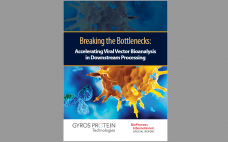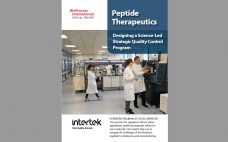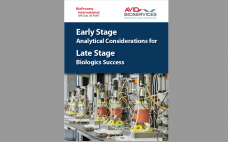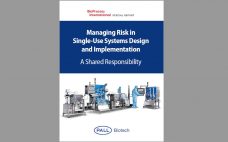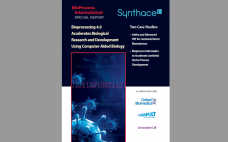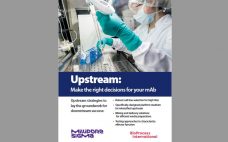The rise in popularity of viral-vector–based gene therapies and SARS-CoV-2 vaccines has created a shortage of manufacturing capacity, driving efficiency improvements to avoid bottlenecks in bioanalysis to support culture optimization and bioprocessing steps. To improve workflows in bioanalytical assay development and sample analysis, more efficient methods are needed that include higher throughput, simpler and more streamlined sample assay methods, wide dynamic ranges, and efficient data processing and interpretation. Gyrolab™ microfluidic, nanoliter-scale immunoassay systems provide an innovative, robust solution to high-performance…
Special Reports
Peptide Therapies: Designing a Science-Led Strategic Quality Control Program
Peptide therapeutics are a unique class of pharmaceuticals. They can fall into one or more regulatory categories: as conventional chemical molecules, biological entities, or biosimilars. Developing a well–thought-out quality control (QC) strategy is key to meeting development milestones and complying with evolving regulatory requirements. Safety assessment is critical because slight changes in the structure, physicochemical properties, stability, and impurity profile of a peptide can provoke an adverse immune response. A robust analytical QC program should be conducted in laboratories that…
Early Stage Analytical Considerations for Late Stage Biologics Success
This BPI Special Report will cover phase appropriate analytical strategies that will balance various drivers to meet overall development goals without sacrificing the requirements of a program. The goal is to provide important recommendations for analytical method development that can help the biopharmaceutical industry identify opportunities to improve lead time and reduce development costs while maintaining required quality standards. Fill out the form below to learn more about analytical method development now. Arugadoss Devakumar, PhD, is director of analytical…
Application of Targeted Locus Amplification for Enhanced Apollo X CHO Clone Screening
Speed to market is an important consideration for the development of lifesaving therapies, including recombinant monoclonal antibodies. However, increased speed must be balanced with quality to enable quick and efficient delivery of biopharmaceuticals to patients. Important determinants of quality include the genomic location and integrity of the transgene sequence within a recombinant cell line. Traditional methods of genetic characterization can provide incomplete information and results can be difficult to interpret. However, next-generation sequencing (NGS) approaches such as Targeted Locus Amplification…
Managing Risk in Single-Use Systems Design and Implementation: A Shared Responsibility
Managing risk in single-use systems design and implementation is a shared responsibility. The ultimate responsibility for drug processes and products will always remain with manufacturers. However, implementation of single-use systems can shift responsibilities to suppliers within key areas, including design and sterilization, which must be clearly controlled and validated. This Special Report discusses how suppliers and manufacturers when working together can mitigate the risk of applying single-use systems in biopharmaceutical production from design through validation to point-of-use testing and operator…
Industrialize Your Viral Vector Production in Adherent and Suspension Cell Cultures: Know the Pros and Cons
This educational podcast, “The Evolution of Culture Systems for Viral Vector Production: Advantages, Challenges and Cost Considerations,” recently published by Cell and Gene Therapy Insights, discusses in detail the pros and cons of viral vector production in adherent and suspension cell culture. This special report illustrates how Pall Biotech’s iCELLis 500+ bioreactors and Allegro STR bioreactors can bolster adherent and suspension culture, respectively, for viral vector production. Fill out the form below to read the complete report and learn more now.…
Are You Missing the Bigger Picture with Your AAV Analytics? Fast, Low-Volume Subvisible Particle Analysis for Characterizing Viral Vectors
Subvisible particle (SVP) analysis is a key indicator of stability and safety and is an essential parenteral drug quality metric. Yet assessment of SVPs is especially challenging in adenoassociated virus (AAV) vector formulations, in which limited precious sample is available. Traditional SVP methods consume large sample volumes, while dynamic light scattering (DLS), size-exclusion chromatography (SEC), and visual inspection can miss aggregates in the subvisible range entirely. This special report introduces backgrounded membrane imaging (BMI) technology as a solution for detection…
Bioprocessing 4.0 Accelerates Biological Research and Development Using Computer-Aided Biology
Computer-aided biology describes a growing ecosystem of tools that augment human capabilities in the laboratory. In this report we give two case study examples of how computer-aided biology has transformed industrial gene therapy bioprocessing. Read on to discover how Synthace’s Antha cloud-based software platform has enabled industrial collaborators Oxford Biomedica and the Cell and Gene Therapy Catapult to harness the power of Bioprocessing 4.0 by: incorporating new process analytical technologies (PAT), such as Raman Spectroscopy, into their unit operations automating…
A Future-Proof Solution for Bioprocess Applications: The New Eppendorf Flexible Bioreactor Control System Evolves with the Changing Needs of Modern Biotechnology
In the biopharmaceutical industry’s quality-by-design (QbD) era, optimizing tools for process monitoring and control has become a major focus of development and manufacturing. This increased attention brings challenges into upstream and production processes, cell-line development, process optimization, and scale-up. Suppliers of equipment and technologies also focus on helping their customers improve development timelines. With that increased attention to speed, they are offering tools such as the Eppendorf SciVario twin bioreactor control system to streamline development and maximize flexibility. BPI spoke…
Upstream: Make the Right Decisions for Your mAb
Bioprocess decisions made during upstream operations can be difficult to reverse at later, more costly stages of biologic manufacture. They even can require significant backtracking, wasting precious time, labor, and material. Read this Special Report to learn ways to optimize monoclonal antibody bioprocessing upstream. Specifically, you will learn about different tools that small and emerging biotechnology groups can use to ensure robust cell-line selection novel media formulations designed for intensified upstream processing in perfusion modes mixing and delivery solutions that…

